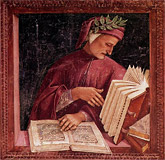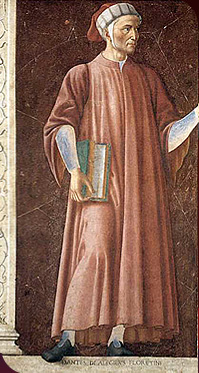
Inside the wide tradition of researches on Dante’s works, not-well examinated is the connection between Dante and the literary production of the previous five-six centuries. The study of Vergil’s medieval tradition and of the many commentaries dedicated to Vergil’s whole production and to Horatius’ Ars poetica becomes absolutely necessary when you consider their importance to Dante’s theoretical and literary thought, to the real idea of comedy and to frequent and punctual quotations of medieval epitafi and Vergil’s biographies in some places of Commedia. Into this tradition of Vergil and Horatius commentaries there are founding moments of poetic discourse between Giovanni del Virgilio and Dante, archetypical model of later Bucolic production. And yet the large collections of political correspondence, Guelf and Ghibelline, of the Thirteenth century: the epistolary collections produced by Papal Curia and by Imperial chancellors are the prerequisite to understand style and arguments of Dante’s letters. Still controversial, in Dante’s critical thought, are also two crucial aspects relating to the Commedia, respectively about the definition of the poem as “vision” or “afterworld travel”, and the nature of dreams and visions in the Commedia, whether that is to be considered mystic tales or poetic inventions. An answer may come from a comparison between Dante’texts and the works of S. Augustine, Gregorius Magnus, Albertus Magnus, Thomas Aquinas, but also of Bernard of Clairvaux, Macrobius, Alanus from Lille. Finally, numerous are the sources, direct and indirect, medieval-latin and vulgar, which can be referred to the Vita Nova, as well as previous Romance sources of Dante’s lyrical works, both in relation to the Rime both philosophical songs of Convivio.
Into DaMA digital archive take place the results of the census of classical, late –ancient and medieval sources in the field of epistolary production, theological, bucolic, mystical and philosophical literature, Vergil and Horatius’ medieval commentaries and Romance lyrical production. The study of these sources appears so significant to rebuild the ideal library of Dante and for the development of more complete and exhaustive comments of Dante’s works (Egloghe, Epistole and Rime), especially about medieval sources.

